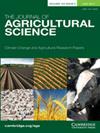龙葵化感作用的研究。可能用于治疗隐匿性脑炎
IF 1.7
4区 农林科学
Q2 AGRICULTURE, MULTIDISCIPLINARY
引用次数: 0
摘要
根结线虫(Meloidogyne incognita)侵染的宿主范围广,造成巨大的农业损失。虽然这种害虫的控制主要基于化学农药的使用,但目前正在广泛考虑天然替代品,特别是使用植物衍生分子,如化感化学物质和植物提取物。龙葵(Solanum stramonifolium)是龙葵科的一种植物,人们已经研究了它控制RKN的潜力,要么是通过使用其种子的水提取物,要么是由于它对线虫渗透的免疫。我们的研究表明,麦草对RKN具有有效的防御机制,完全阻止RKN渗入其根系。此外,该植物在土壤中渗出的化合物可以影响附近生长的本烟(Nicotiana benthamiana)(处理1生物量为-89%,处理1生物量为-61%和+57%)和番茄茄(Solanum lycopersicum)(处理1生物量为-79%,处理1和处理II生物量为-83%)的线虫感染。本文从S. stramonifolium种子提取物中制备了外部(ED, < 3.5 kDa)和内部(ID, > 3.5 kDa)透析液。经透析液处理的RKN接种的拟南芥Col-0, ED和ID的胆径分别减少45%和35%。此外,在处理后的萌发种子中,生物量显著减少。此外,与未处理的对照相比,ED和ID处理的拟南芥根系的倍性水平发生了变化,这表明ED和ID对内复制细胞有影响。最后,ED和根提取物中存在的部分糖生物碱鉴定可能有助于解释植物对根结线虫感染的免疫。研究结果揭示了S. stramonifolium对M. incognita的防御机制,其在共栽培植物中的化感作用潜力及其种子透析液的生物技术潜力,代表了传统农业中RKN管理的强大替代方案。本文章由计算机程序翻译,如有差异,请以英文原文为准。
Allelopathic Interactions of Solanum stramonifolium Jacq. Might Be Used for Meloidogyne incognita Management
The root-knot nematode (RKN) Meloidogyne incognita infects a large host range causing enormous agricultural losses. Although the control of this pest is mainly based on the use of chemical pesticides, natural alternatives are currently being largely considered, especially the use of plant-derived molecules, as allelochemicals and plant extracts. Solanum stramonifolium is a plant of the Solanaceae family and has been studied for its potential to control RKN, either by the use aqueous extracts of its seeds, or due to its immunity to nematode penetration. Our studies demonstrate that S. stramonifolium has an efficient defense mechanism against RKN completely preventing its penetration into its root system. Additionally, the compounds exuded by this plant in the soil can affect nematode infection in nearby grown Nicotiana benthamiana (-89% biomass for treatment I respectively, and -61% and +57% of galls for the treatments and Solanum lycopersicum (-79% biomass for treatment I, and -83% of galls for the treatments I and II). Herein, external (ED, < 3.5 kDa) and internal (ID, > 3.5 kDa) dialysates were prepared from the extract of S. stramonifolium seeds. Arabidopsis thaliana Col-0 inoculated with RKN treated with the dialysates showed a reduced gall diameter in 45% and 35% for ED and ID respectively. Additionally, a significant reduction in biomass was observed in germinated seeds after treatment with ID. In addition, Arabidopsis roots showed changes in their ploidy levels when treated with ED and ID, compared to the untreated control, indicating its effect on endoreduplicating cells. Finally, a partial identification of glycoalkaloids present in the ED and root extracts may help to explain plant immunity to root-knot nematode infection. Results obtained shed light on the defense mechanisms of S. stramonifolium against M. incognita, its allelopathic potential in co-cultivated plants and its biotechnological potential of dialysates obtained from its seeds, representing a strong alternative to the management of RKN in conventional agriculture.
求助全文
通过发布文献求助,成功后即可免费获取论文全文。
去求助
来源期刊

Journal of Agricultural Science
农林科学-农业综合
CiteScore
2.80
自引率
5.00%
发文量
68
审稿时长
1.4 months
期刊介绍:
The Journal of Agricultural Science publishes papers concerned with the advance of agriculture and the use of land resources throughout the world. It publishes original scientific work related to strategic and applied studies in all aspects of agricultural science and exploited species, as well as reviews of scientific topics of current agricultural relevance. Specific topics of interest include (but are not confined to): all aspects of crop and animal physiology, modelling of crop and animal systems, the scientific underpinning of agronomy and husbandry, animal welfare and behaviour, soil science, plant and animal product quality, plant and animal nutrition, engineering solutions, decision support systems, land use, environmental impacts of agriculture and forestry, impacts of climate change, rural biodiversity, experimental design and statistical analysis, and the application of new analytical and study methods (including genetic diversity and molecular biology approaches). The journal also publishes book reviews and letters. Occasional themed issues are published which have recently included centenary reviews, wheat papers and modelling animal systems.
 求助内容:
求助内容: 应助结果提醒方式:
应助结果提醒方式:


